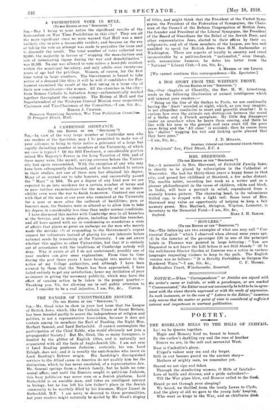A PROHIBITION VOTE IN HULL.
[To 7IIE EDITOR OF THE " SPECTATOR."] SIR,—May 1 bring to your notice the significant results of the Referendum on War Time Prohibition in this city? They are all the more significant since we were warned that Hull was a most unlikely city to give a favourable verdict; and because on the eve of taking the vote an attempt was made to prejudice the issue and to discredit the result. The total number of votes collected was 92,600; the majority in favour of "stopping the manufacture and sale of intoxicating liquor during the war and demobilization " was 11,503. No one was allowed to vote unless a bond-fide resident within the municipal boundary, and only adults over twenty-one years of age had the privilege. Women, of course, for the first time voted in large numbers. The Government is bound to take notice of a demand like this; it will be well if candidates for Par- liament examined the result of the first voting in a large city of their new constituents—the women. All the churches in the city— from Roman Catholic to Salvation Army—enthusiastically worked together throughout the campaign. The Bishop of Hull and the Superintendent of the Wesleyan Central Mission were respectively Chairman and Vice-Chairman of the Committee.—/ am, Sir, he., HAROLD J. CHAPMAN, Honorary Organizing Secretary, War Time Prohibition Committee.
79 Prospect Street, Hull.


























 Previous page
Previous page